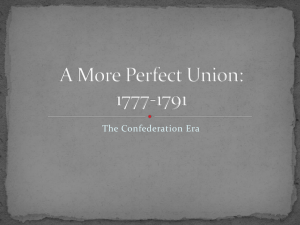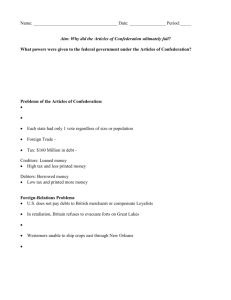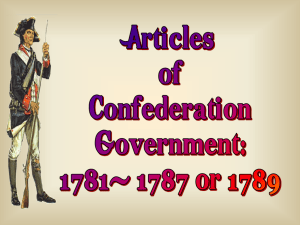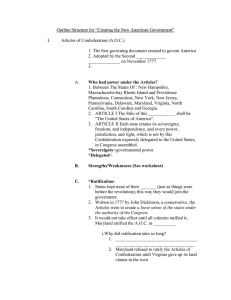The Articles of Confederation
advertisement
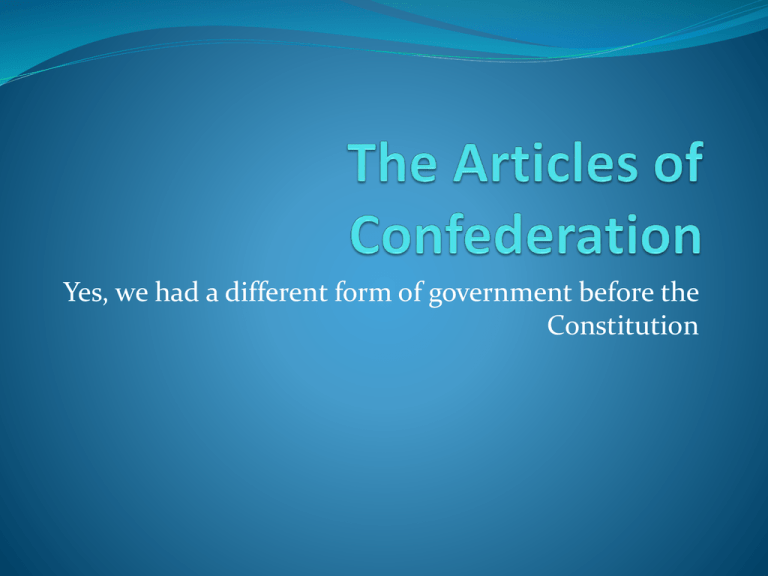
Yes, we had a different form of government before the Constitution What type of government do you think Americans would want to create after breaking away from Great Britain? The Big Question What should the relationship be between the new states and the national government? This proved to be very difficult to define Back Before/During Revolution Colonies had their own distinct governors, councils, and colonial assemblies They thought of these colonies as the primary political unit (Remember when John Adams referred to Massachusetts as his “country”?) Republic Americans at this time worried about establishing a democracy – why do you think this would be? So they decided to set up a republic – a government in which the citizens rule through elected representatives Republicanism – idea that the government should be based on the consent of the people State Constitutions Each state created its own constitution Guaranteed rights: freedom of speech, religion, and the press Emphasized liberty rather than equality Reflected fear of centralized government State Constitutions Differed widely African Americans generally not allowed to vote Some states granted voting to all white males Other states (like Maryland) – property ownership also a requirement New Jersey! Women had been denied right to vote in most states But NJ gave voting rights to all free property owners but neglected to specify males! Some NJ women gained right to vote as a result But in 1807 this right was revoked Again so the main concern US didn’t know how to balance concerns of state and national governments There were no political systems that could serve as models (unless they wanted to look back to the Roman Empire and Italian city-states of the Renaissance) What do you think the Continental Congress decided to do? Delegates had to Answer 3 Questions Representation by Population or by State? Does each state receive just 1 vote or should they be given # votes based on population? Supreme Power: Can it be Divided? Should there be a strong centralized government or should separate states have more power? Western Lands: Who Gets Them? What happens to the land west of the Appalachians? Representation by Population or State? Members of Continental Congress saw themselves as representing independent states. Each state would have one vote regardless of population! This will probably cause problems later down the line… Supreme Power: Can it be Divided? Articles of Confederation – new form of govt Adopted on November 15, 1777 Enforced from March 1, 1781 to 1789. 2 levels of government shared fundamental powers State govts supreme in some matters, while national govt supreme in others New natl govt power to declare war, make peace, and sign treaties, borrow $, set standards for coins, establish postal service, and deal with Native Americans Problem There was no separate executive department to carry out and enforce acts of Congress and no national court system to interpret the meanings of laws!!!! Articles had a lot of problems… Economic issues like taxation and dealing with national debt Political issues like nature of Congressional representation Foreign-relations problems that Confederation powerless to solve Lacked National Unity This was the most serious problem Each state looked out for its own interest rather than the best interest of the country Georgia had population of 23,375; Massachusetts 235,308 – each had 1 vote Is that fair? Articles could not be amended without the approval of every single state! More Problems What happens when we have war? Answer: There’s a lot of accumulated debt Revolutionary War cost $190 million Continental Currency was worthless Congress lacked power to tax (!!!) so Congress requested approval to impose a tariff, or tax on imported goods How do you think the Congress responded to this call for help? Well… They had wanted to use money from proposed tariff to pay off foreign loans But… One state (Rhode Island) rejected the proposed tax So it wasn’t adopted Confederation Congress had no control over interstate or foreign trade Creditors vs. Debtors Creditors (lenders of $); debtors (borrowers) After war – wealthy people who lent $ to states favored high taxes so states could pay them back High taxes put farmers in debt Debtors and creditors disagreed over usefulness of paper $ Debtors wanted to increase money supply to lesson its value and so they could pay off debts Creditors wanted to keep supply of money low to keep its full value Foreign-Relations Problems British refused to evacuate its military forts on Great Lakes since US could not repay its debts to British merchants (when did they promise they would pay back these debts?) 1784 – Spain closed Mississippi River to American navigation This hurt farmers substantially One good thing did happen Remember that 3rd thing the Articles needed to address: Western Lands: Who Gets Them? Well – they actually figured out a solution to this, and it was a good one. So pay attention to the next slide! Land Ordinance of 1785 Lands west of the Appalachians – made these land parcels small and affordable Government would survey the land, dividing it into townships of 36 square miles Each township would be divided into 36 sections of 1 square mile, or about 640 acres, each. You could purchase 1 section Typical farm – equal to ¼ section (160 acres) Minimum price was $1 Continued Section 16 would be used for school buildings Local people used the sale of this land to build a school and hire a teacher Centrally located so students wouldn’t have to travel far Yay school! Northwest Ordinance of 1787 Congress provided procedure for dividing land into territories Set requirements for becoming a state (they overlook Native American interests as usual) 3 basic stages for becoming a state: Congress would appoint territorial governor and judges When there were 5,000 voting residents – settlers could write temp constitution and elect own govt When 60,000 free inhabitants – settlers could write state constitution which had to be approved by Congress before statehood granted. So… Land Ordinance of 1785 – Established plan for dividing unclaimed land in the west Northwest Ordinance of 1787 – How a territory would become a state To Sum This Up… Americans’ fear of giving too much power to national government resulted in government that lacked sufficient power to deal with nation’s problems. The forthcoming Constitutional Convention would change all this though! Your Turn Please compose a list of the weaknesses of the Articles of Confederation (and any strengths if you can think of them)

